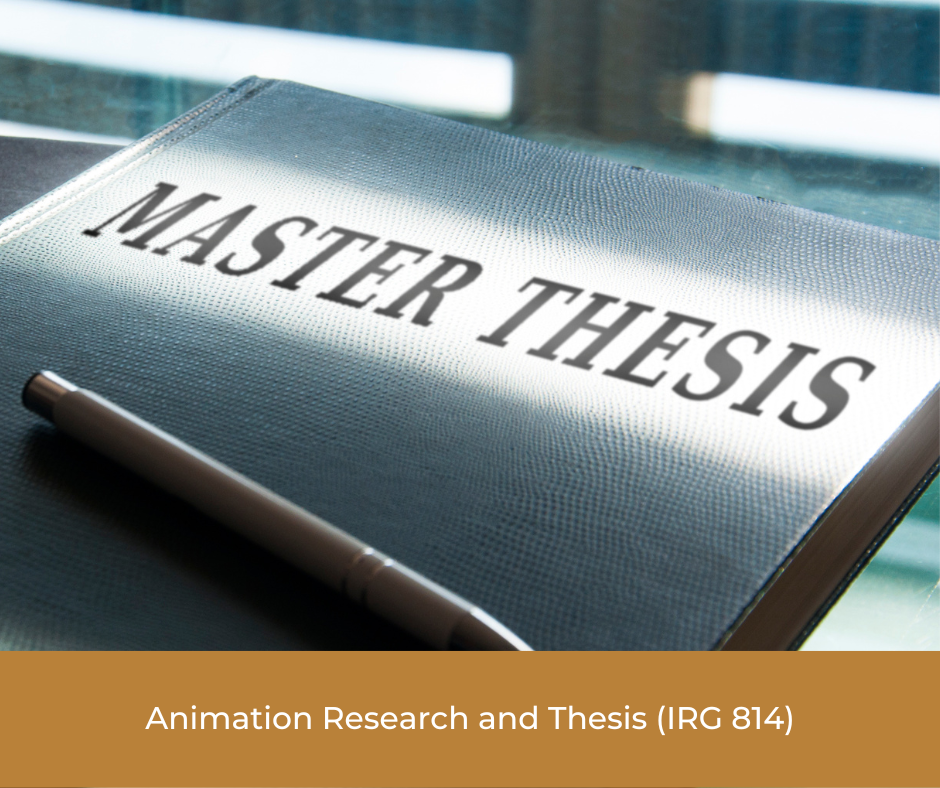Course Description: The Animation Research and Thesis course is a capstone experience designed for students to delve into a specialized area of graphic animation. In this course, students conduct in-depth research, develop a comprehensive thesis project, and present their findings. This course aims to provide a platform for students to apply research methodologies and creative skills to an animation project that showcases their expertise in a specific area of interest within the field.
Outline of Major Content Areas:
- Literature Review and Research Methodologies:
- Exploration of relevant academic and industry literature within the chosen area of animation.
- Introduction to various research methodologies and tools suitable for animation research.
- Project Proposal and Development:
- Crafting a well-structured project proposal that outlines the research goals, methodologies, and creative components of the animation project.
- Development of project milestones, timelines, and resources required for successful project execution.
- Animation Production and Execution:
- The practical aspects of producing the animation, including design, animation techniques, sound design, and post-production.
- Incorporation of research findings into the creative process to produce a project that reflects a deep understanding of the subject matter.
- Thesis Presentation and Defense:
- Preparing and delivering a comprehensive thesis presentation that highlights the research findings, the animation project, and the overall creative process.
- Engaging in a thesis defense where students respond to questions and provide evidence of their research and creative contributions.
- Research Projects:
- Students will choose a specific area of interest within animation, conduct in-depth research, and produce a final animation project that serves as their capstone work.
- Projects should demonstrate a significant contribution to the field and reflect the integration of research findings with creative execution.
Course Learning Outcomes:
Upon successful completion of this course, students will be able to:
- Research Proficiency:
- Conduct a thorough literature review in their chosen area of animation, identifying key academic and industry works.
- Apply appropriate research methodologies to investigate and address specific research questions.
- Project Proposal and Development:
- Develop a clear and comprehensive project proposal that outlines the research objectives and creative components of the animation project.
- Create a detailed project plan, including milestones and resource requirements.
- Animation Production and Execution:
- Execute an animation project that demonstrates advanced technical and creative skills, including animation techniques, sound design, and post-production.
- Integrate research findings effectively into the creative process.
- Thesis Presentation and Defense:
- Prepare and deliver a compelling thesis presentation that effectively communicates research findings and creative contributions.
- Engage in a thesis defense, confidently addressing questions and providing evidence of their research and creative work.
- Research Project Mastery:
- Demonstrate a deep understanding of the chosen area of animation through the production of a high-quality animation project that reflects research insights and creative expertise.
- Showcase the ability to make a significant contribution to the field of animation.
Methods for Assessing Student Learning:
Assessment in this course will encompass various methods to evaluate students’ research, creative, and presentation skills:
- Project Proposal Assessment: Evaluation of the clarity, completeness, and feasibility of the project proposal, including the research objectives, creative components, and project plan.
- Animation Project Evaluation: Assessment of the quality and creativity of the final animation project, considering design, animation techniques, sound design, and the integration of research findings.
- Thesis Presentation Assessment: Evaluation of the effectiveness of the thesis presentation, including the clarity of communication, coverage of research findings, and the ability to engage the audience.
- Thesis Defense Assessment: Evaluation of students’ ability to respond to questions, provide evidence of their research and creative contributions, and defend their thesis.
- Overall Project Assessment: An evaluation of the overall project, taking into account the research component, creative execution, and the ability to make a significant contribution to the field of animation.
By successfully completing this capstone course, students will showcase their advanced skills in animation research and creative execution, culminating in a thesis project that highlights their expertise in their chosen area of animation.
